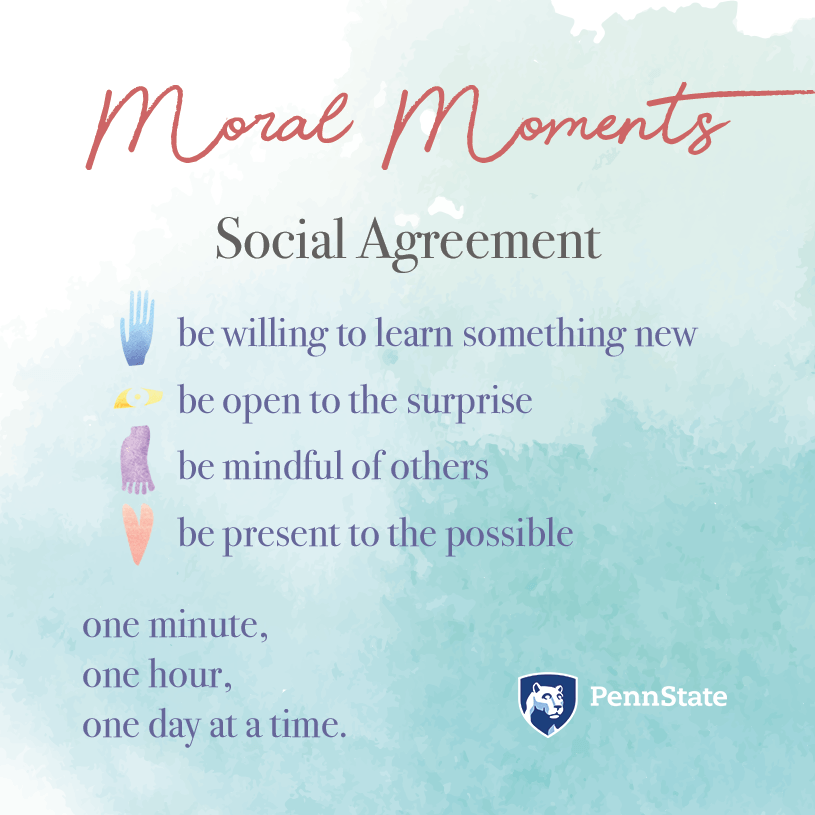Foundations
Moral Moments, at its core, is about meaningful communication. That can’t happen without three things: (1) social agreements, (2) a basic understanding of the ways a person’s views can be manifest in their communication with others, and (3) recognition of the choices we have about how to contribute to conversations. Learn more about these foundations to communication.
The WOMPP Factor
The WOMPP Factor lets you establish a social agreement that helps to foster meaningful communication.
The WOMPP Factor asks participants:
- Are you willing to learn something new?
- Are you open to a surprise?
- Are you mindful you are not the only person “in the room”?
- Are you present so you can be possible?

This and That
Have you considered the very nature of your contributions? Examining the nuanced differences between the word pairs in the following list can open us up to a wider and more thoughtful range of contributions. Explore what language looks like in each instance. Ask yourself, “How is language different when expressing an opinion, versus when making an observation?” Stop, look, and listen for examples of each during your discussions and have students evaluate and try out new options!
- Comments and contributions
- Opinions and observations
- Reactions and responses
- Curiosity and judgment
- Statements and questions
- Realizations and performances
- Awakening and accomplishing
4 Ps and a C
These definitions will be useful in the course, so become familiar with them and think about how they work in your daily experiences of the world. If you can do that, you’ll begin to figure out where things, ideas, and people can fall through the cracks of a culture.
- Perspective –the interrelation in which a subject or its parts are mentally viewed (Merriam-Webster.com)
- Privilege – a special advantage, immunity, permission, right, or benefit granted to or enjoyed by an individual, class, or caste (The Free Dictionary)
- Prejudice – preconceived opinions “that are not based on reason or actual experience” (Oxford Dictionary)
- Purpose – the reason for which something exists or is done, made, used, etc. (Dictionary.com)
- Civility - Civility is about more than just politeness, although politeness is a necessary first step. It is about disagreeing without disrespect, seeking common ground as a starting point for dialogue about differences, listening past one’s preconceptions, and teaching others to do the same. Civility is the hard work of staying present even with those with whom we have deep-rooted and fierce disagreements. It is political in the sense that it is a necessary prerequisite for civic action. But it is political, too, in the sense that it is about negotiating interpersonal power such that everyone’s voice is heard, and nobody’s is ignored. And civility begins with us. (http://www.instituteforcivility.org/who-we-are/what-is-civility/)
Backpack Questions
Backpack Questions: Managing Resistance. Resistance is a common during times of change. Use this reflection and discussion exercise to consider why.
What if we thought of resistance in this way: as if we are carrying backpacks full of resistance into every situation? What if we don’t even know we are carrying a backpack? Here is a set of questions that might help you “unpack” some of the weight from your backpack. It’s an opportunity to question yourself in the act of thinking. Be aware of where and when you meet some interior resistance to an idea or question.
- How do you understand that resistance? Is it a feeling? A memory? A voice from the past or present? An event that pops up?
- What exactly does this resistance “do” to your thought process in the present moment? If you become aware of your own resistance to a question or an idea or a new thought, you might have stumbled on an obstacle that keeps you from being open to something new.
- If you find yourself resisting a question, just stop, take a breath, and figure out where your mind went. Once you figure that out, just say “oh,” and move on to the next question. Those “ohs” are worth thinking about later on.
- And let’s shake a few terms out of your backpack.